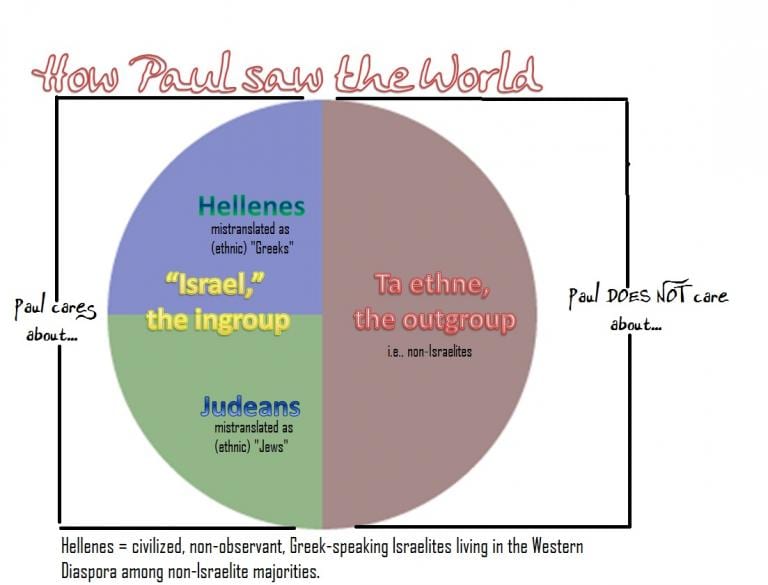The Gospel story from “Luke” concerning entry through the narrow gate offers a great challenge to really strive to understand Jesus.
The Gospel for this past Sunday, August 25, offers a spiritual challenge to Western 21st century Christians. The narrow-gate is an entry for those whose relationship with Jesus is real and radical. A blockage of traffic at the point of entry is filled with lots of talk but little walk. Do we desire only acquaintance with Jesus or to truly know him?
In Luke 13:18-21, Jesus speaks about the forthcoming theocracy (“the Kingdom of God”). It’s an unusual presentation of a familiar subject matter, turned upside-down for his contemporaries.
Throughout the Mediterranean world of Jesus and “Luke,” only great ones, elites like nobles and warriors, were associated with kings and kingdoms. Such was the acquaintance with theocracy belonging to almost every first century Israelite. But the Lukan Jesus describes the Kingdom of God employing metaphors taken from the ordinary daily life of Galilean peasants. What!?
High Context and Low Context
Luke 13:23
“Someone asked him, ‘Lord, will only a few people be saved?’”
All ancient documents are “high context” literature. The Bible is no exception. High context literature means the authors of such documents assume that their readers share with them a vast depth of common information keyed to the same social context. This auxiliary background social knowledge means much is left unsaid. Therefore explanation is not required! A lot gets said in sparse words!
What a contrast that is to our extremely specialized and complex Western cultures! Ours is a low context culture. Therefore, the literature of our acquaintance is low context also. Thus the background of everything is expected to be explained in detail—think credit card agreements, loan applications, and such. So Western authors, considerate of their Western audience, follow this rule with their low context documents. Important background information is given.
This cultural acquaintance for Western low context documents proves to be a perennial disaster for U.S. Bible readers. We tend to read documents like the Bible as if they were written for, by, and about us, or people like us (i.e., low context Westerners)! And because we are so used to reading literature where all information gets provided and spelled out, we assume the same situation is at work in our Mediterranean Bible!
The Context Group of Biblical Scholars have shown convincingly that, typically, our Western, 21st century brains attempt to fill the massive gaps of cultural information we stumble on in almost every Scripture passage. This means we fill the gaps with ethnocentric anachronisms. Our “Bible reading” easily becomes a violent distortion and loss of context.
High Context “Luke”
The Gospel we call “Luke” is high context literature. Neither the prepaschal Jesus nor “Luke” were universalists. This text is not about getting saved from hell. It’s not about all humankind getting saved, at least not in its literal sense, which comes first (Universal Catechism, n. 126). Such notions were alien to the acquaintance of ancient peoples.
When we read in “Luke” that “Will only a few be saved?” we must unpack that high context question. “Will God save only a few members of humankind?” is inappropriate. The correct meaning is: “Will the God of Israel save only a few in Israel?” For “Luke” and most other New Testament documents, “salvation” means participating in the soon-to-be-inaugurated Israelite theocracy.
Luke 13:24-30
United States culture is the most individualistic in recorded history. As social analyst Geert Hofstede explains, today only 20 percent of people on earth are individualists. To us, “the self” is a cognitive and emotional universe chemically isolated from all others, unrepeatable, unique, discovered and unlocked via psychology. But even today such individualism is strange to about 80 percent of all cultures.
In the ancient world individualism was almost completely absent. So there is nothing like American life to be found anywhere in the Scriptures. There one’s “self” is always the group-self. Thus, American Catholics reading Jesus asking the questions of Mark 8:27-30 and Matthew 16:15 ought to remember that he wasn’t an American individualist buying Western values.
United States persons are predictably blind to this ancient acquaintance of “self” when they read about Jesus and the Gospels. We are dominated by a fierce predilection for a Jesus who is congenial to our American cultural values. In fact, we could not stomach an un-American Jesus. We will talk more on this, soon.
Jesus the Collectivist
In Herodian Palestine one’s identity was social and not individual. Again, in this world “self” always means group-self. This is just like how most people (80 percent) perceive, think about, understand, and communicate in our world today. Two fantastic movies playing in theaters right now give Western Christians an opportunity to taste this: The Farewell, directed by Lulu Wang, and Blinded By the Light, directed by Gurinder Chadha. Check them out!
In Jesus’ world people identify others by their group-self because there the “I” is always embedded in the “We.” “To which group do you belong?” means who are you?
Is this Jesus from Nazareth? Embarrassingly, yes, he was. See? The label “Nazarene” was encoded with all the information Jesus’ contemporaries would ever need to know about him. He is stereotyped, socially locked forever in place by that honor-rating.
So who are we talking about again? “Jesus of Nazareth, the…” It’s over. Once they heard “of Nazareth,” deafness followed. Jesus of Nazareth is a nothing-person from a nothing-hamlet in a nothing-place, Galilee. Now we can forget all about him or any claim of grandeur he or another might make for him. In this world stereotypes do count and words or labels can do far worse than break your bones. If they know where you come from, everything they need to know about you has been already provided with nothing to add.
We must take the prefix “in” of “inspiration” seriously. Inspiration is messy! The Bible is Mediterranean and thus stereotyping fills its pages (see Titus 1:12; Mark 7:27; 14:70; John 1:46; 4:9). You can almost see why the political-religious title “Christ” soon had to mutate into becoming Jesus’ last name! Due to his embarrassing origins someone early on felt that they had to cut objections off at the chase!
Know Thyself? Ha!
In this past Sunday’s Gospel, when the master of the house says, “I do not where you are from” (Luke 13:25) it is equivalent to saying, “I do not know you.” In the Mediterranean world of the Bible—of which the peasant day laborer and village artisan Jesus was very much a part—the stereotypes belonging to one’s village tells everything needed to know about that person.
We Americans and other Western people believe that psychological-knowledge of one’s self is the way people come to know themselves. But biblical people like Jesus were anti-introspective and therefore were oblivious to Western notions of psychological development.
Every time a homilist, preacher, ministry-leader, Christian author or public speaker gives a commentary about Jesus’ or some other Biblical character’s feelings and emotional states (e.g., David was feeling guilty when he wrote Psalm 51, etc.), know for sure this is ethnocentric and anachronistic distortion of the Scriptures. Biblical authors and characters didn’t give a damn for thinking about their individual selves like we do (psychological guilt). Rather, they were obsessed about how others judged them, how they were perceived publicly (honor-shame).
Biblical Conscience vs Western Conscience
So in the Bible whenever someone talks about “conscience” (e.g., Paul’s words in 1 Corinthians 4:1-4), don’t think Jiminy Cricket! Don’t think Freud’s “superego” or some “inner voice” of psychological guilt (a Western social control unknown in the Bible). Don’t think anything Jungian! Biblical “conscience” means the publicly-accusing voice of others.
As with “IN+spiration,” Christians must take the prefix “in” of “incarnation” seriously also. Since it was INTO the Mediterranean world of anti-introspective, dyadic MENA personalities that Jesus was born, socialized, and enculturated, we should not expect from him a Western existentialist “Who am I?” Self knowledge originated in significant others from one’s group, never from their individual self! Therefore “Who do people say that I am?” means “Who do YOU ALL [my ingroup] say that I am?” (see Mark 8:27-30)
While Luke Skywalker may indeed be a hero with a thousand faces, not a single one of those faces is Middle Eastern. Sorry George, Joe, and Carl.
Ways of Sharing Kinship
In this Sunday’s Gospel the Israelites interested in sharing in theocracy were not blood-relatives to Jesus. They were not his dyadic-personality alter-egos from his home town. So they claim the next best unitive glue—acquaintance through table fellowship. How did one know that one belonged to the ingroup in ancient times? You had to share a common substance with them.
As the late John Pilch explained, if you are born into a family or village in the biblical culture where the ideal marriage partner is your patrilateral first cousin, you relate by the substance of blood. Or say you share the substance of milk from a wet nurse—that relates you closer than cousins and you violate incest taboos should you marry your kin-by-milk. Different societies recognize the commingling of common bodily substances (whether blood, milk, semen, or spit) as the bond that creates kinship.
Sharing meals also does this in the world of the Bible. One way such people know they belong to the common ingroup was by sharing meals. Only social equals can share in this. In this Sunday’s Gospel, although the householder in Jesus’ example does not recognize them, Israelites knocking at the door claim social solidarity with him by their having broken bread and shared a cup together in his presence. They feel they deserve access to Theocracy.
“Breaking bread,” “sharing cup,” “his presence”… hmmm. Sound familiar, Catholics?
“Will only a few be saved?”
The question whether only some or all Israelites would share in olam ha-ba (the world to come) vexed many Israelites. Our Jewish sisters and brothers can point to the Mishnah (ca. 200 CE) to answer that all those belonging to Israel will. But the Gospel passage for this Sunday alludes to the fact that different Israelite opinions on the question had been vogue at different times. The apocryphal 4 Ezra 8:1 reads—
“The Most High made this world for the sake of many [Israelites], but the world to come for the sake of few” [Israelites].
Jesus was all about theocracy, the kingdom of God. It was the center and focus for all his healing actions, everything he proclaimed. In this Sunday’s passage from “Luke,” his contemporaries press him: how many of us Israelites will share in it?
Who will make it? Who can say other than God? This is God’s affair. The Lukan Jesus does not disrespect the patron God of Israel. So he refrains from answering the question directly.
Instead, and consistent with the prophetic tradition in Israel, Jesus warns that many worthless Israelites will attempt to enter Theocracy. But Jesus insists that superficially relating to him won’t cut it.
“I do not know where you are from.”
The Lukan Jesus offers a reflection. In it, the householder represents Jesus. He refuses to acknowledge many of his fellow Israelites. He refuses to admit them to the Feast (i.e., the Kingdom), even those who have listened to him, ate and drank with him, and knew him. Jesus the Householder locks them out!
To better see why this is shocking let’s take a brief glimpse at Galatians 1-2. The situation there helps illuminate this Sunday’s Gospel. Paul (a very difficult person to get along with) was enraged at Peter (undoubtedly another very difficult person). Peter was a barbarian Israelite (wrongly translated “Jew”).
According to Paul, Peter used to eat with civilized Israelite émigré believers living among non-Israelite Mediterraneans (wrongly translated “Gentiles” or “Greeks”).

Since only social equals share table fellowship in this world, Peter was proclaiming by symbolic action that both Barbarian Israelites (wrongly conceived of as “Jews”) and Civilized Israelites (wrongly conceived of as ethnic Greeks) loyal to Jesus messiah were kin! Distinctions did not apply.
Sharing the Common Meal Seals Kinship
In the Mediterranean world of the Bible, the act of eating together seals friends into a common ingroup, a Mediterranean family, a group-self. In the Common Meal a metamorphosis happens to strangers. The Common Meal transforms them, integrates them into the fictive (not fictional!) kin group and they really do become kin.
But as reported by “Galatians,” Barbarian Israelite “pillar” Peter stopped eating with the Civilized Israelite believers. This was because he had scandalized some of his fellow Barbarian Israelite believers. These Judean believers were scandalized because they felt that in order to belong to the in-group of Jesus messiah, you have to first practice their Barbarian Israelite customs (e.g., male genital mutilation, dietary regulations, etc).
To understand Peter’s change recall that “conscience” in this world is nothing introspective but the publicly-accusing voice of significant others from the In-Group-Self.
This is why Paul was incensed. By ceasing sharing the Common Meal with Civilized Israelite believers, Peter was publicly saying that they were not true kin with Jesus. He was proclaiming them as not really being members of Jesus’ ingroup.
“Galatians” to “Luke”
Returning to this past Sunday’s Gospel reading, those who knock at the door demanding entry are expressing the same thing in Paul’s argument with Peter. “Why won’t you let us in? You are us! We are you! We belong at table together as we have been! We are kin!”
While this may be true, for Jesus it is not enough to enter the Banquet of Theocracy. Without metanoia—becoming a new person, being radically transformed in life—it is impossible to be related to Jesus in Theocracy.
Maybe Jesus did preach on their streets. So what? Listening to Good News is insufficient. Radical transformation is necessary to enter the Feast.
And maybe these sons of Abraham did eat with Jesus, break bread and drink with him, in his presence. So what? This is not enough if lives aren’t being changed. In fact, doing such without metanoia would be the work of evildoers.
The Narrow-Gate of Verbal Orthodoxy
How does this translate for 21st century Western Christians? What are the marching orders or direct answers for us living today? How do we apply this Gospel to our lives?
In 1987 the United States bishops cautioned the faithful from looking in the Bible for all the direct answers for modern living. The reason? They cannot be found there.
However, we might find some interesting directions for our situation in an indirect and sacramental reading of this Gospel.
Being a daily communicant and verbally orthodox does not guarantee a living relationship with Jesus. There are Catholic business owners who behave this way and yet defraud their employees. There are American Christians who proclaim proudly their belief in the Incarnation of God the Son all the while holding racist, sexist, and homophobic views incompatible with belief in the Incarnation.
The deafening silence about these glaring problems in Catholic parishes throughout the United States speaks much about our superficial unity with him. We lack life-giving transformation. The fruit can be seen everywhere. Perhaps we shouldn’t focus so much on belief in his Presence, but more on our own lack of being present.
Slandering Jesus
Too many United States parish leaders compare themselves to lions, tigers, and sharks. Terminally ill people need to wake up. Reality begins with acknowledging being lovable in mortality. As the prophet Cornell West says, we are born in the funk between urine and feces and we will become the funky feast of worms, soon. And so will all fellow inmates in the asylum we call society. Love works messy here.
Starving Galilean peasants lived this. In+carnation happens in this. In+spiration happens in this. This is lightyears removed from our kitschy, alien-life-form depictions of Jesus, Mary and the Saints.
The real Jesus crossed all social divides and made himself available to the outcast, the marginalized, the degraded and unclean throw-aways, the nothing people. For us to distort his Eucharist into a magical event for the clean, well-dressed, successful, and so-called “winners” is a sacrilege and blasphemy. Blasphemos in the ancient Geek means slander, and that is what we “evildoers” do by either actively participating in or silently enabling this slander of Jesus.
Turning our parishes into club houses of wealthy head-nodders meanwhile excluding the homeless, all the while we sing Jesus’ name? This is too Constantinian, American-style. We have to change. All the Jesus-talk and receptions of communion we do become one grand sacrilege without transformation.
American Churches sing of Jesus but mollycoddle the ultra-wealthy, the popular, the socially acceptable. How far we are from the real Jesus, the Reality behind the Holy Name, the Master of the House! Will we change? Or will we stay a blasphemous mockery?
Superficial relations with Jesus don’t help anyone. The “amen” we say receiving Communion ought to be real.













